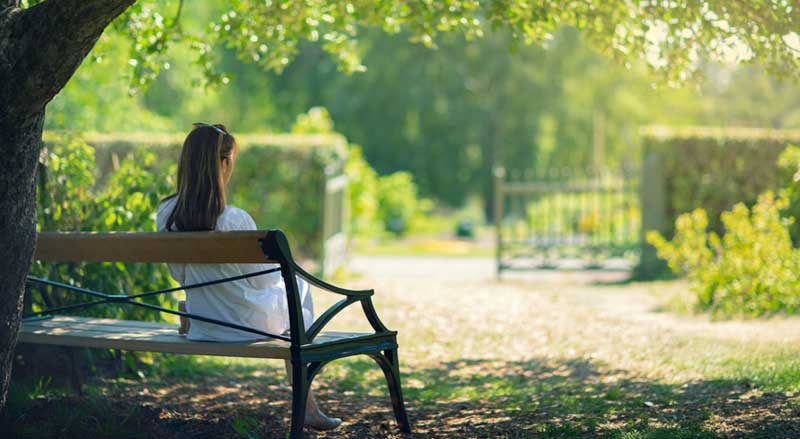We all know things we can do to cool ourselves down in the summer heat, such as stay hydrated and dress in light clothing. But our landscapes can wilt in the summer too without proper preparation and immediate care.
Here are things you can do to help your landscape survive the summer heat.
Plan With the Changing Seasons in Mind
If you live in a state, like New Jersey, that has freezing winters along with hot summers, don’t forget to plan for the summer heat when planting.
Use Native Plants and Know Your Planting Zones
Think about using plants that are native to your area. Native plants thrive in your climate and stand a greater chance of surviving even the most extreme local weather.
Here’s information about plants native to New Jersey.
When planning your summer landscape, select plants that do well in hot weather.
Understand planting zones for New Jersey landscaping. Stay away from plants that meet only the edges of your zone’s heat tolerance.
You can plan an environmentally friendly sustainable landscape.
There are also exotic and specimen trees that do well in New Jersey.
Plan for Shade in Your Garden
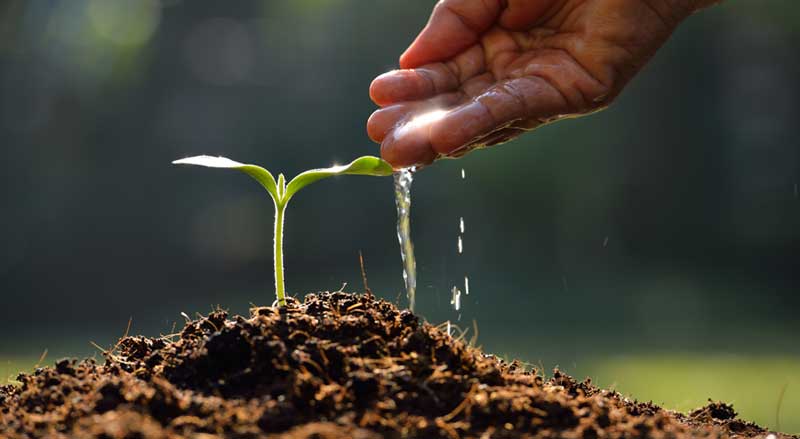
Plant delicate seedlings where they will be protected from the sun.
Place heat sensitive plants near a tree for dappled shade or near a bush. This will keep them from getting too much sun. Ornamental grasses add interest and will offer shade to shorter plants.
But be sure plants will still get some sunlight; most won’t thrive in total shade.
Pay attention to the sun and shadows as they move through your garden during the day. Take these patterns into account when selecting locations for seedlings.
Here are some plants and shrubs that thrive in the shade.
Include Irrigation in Your Landscape
Proper irrigation will help keep your landscape healthy throughout the year.
Water provided by irrigation is much less likely to evaporate than water supplied by a hand-held garden hose or sprinkler. It will be a bonus during the intense summer heat.
A soaker hose is a common way to keep plants well-watered. You can easily hide the hose under mulch or soil.
A rain barrel added to your irrigation system will make clever use of recycled rainwater and reduce your water consumption.
Maintain Your Garden Year-Round
Keeping your garden as healthy as possible in cooler weather will help it survive in stressful summer heat.
Be sure to provide the proper care year-round:
- Watering
- Fertilizing
- Weed control
- Pest control
Weed Regularly
Weeds fight your plants for water and nutrients, and usually win!
Don’t let weeds accumulate in your yard; remove them at regular intervals when you see them.
Mulch
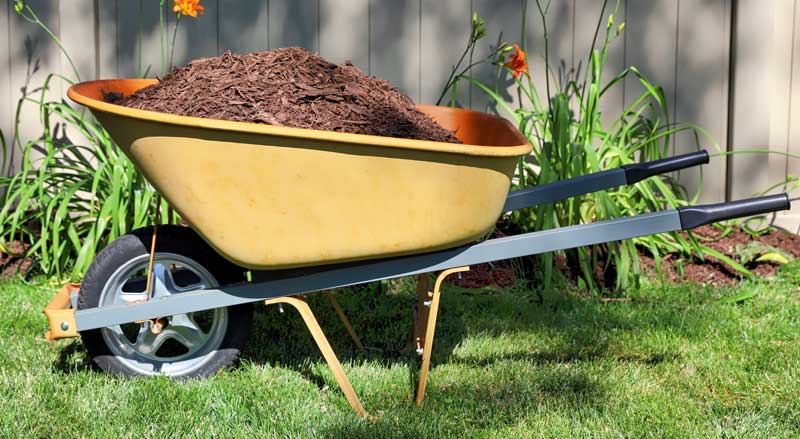
Mulch protects bushes, flowers, and trees year-round.
In the winter, mulch protects developing root systems. In the summer, mulch serves as a layer of protection from the heat and keeps plants from overheating and dehydrating.
Summer mulching keeps root systems insulated. It keeps water from escaping during the day after the morning watering and keeps the ground damp longer.
Provide Adequate Watering
Don’t go light on watering just because it isn’t hot outside. Providing adequate watering helps roots become strong and grow deep. These well-developed root systems help in summer heat, and they help plants recover after extreme heat or drought.
The Summer Heat’s Here! Now What?
Know How to Recognize Heat Stress
Different plants exhibit heat stress differently. Many overheated plants will wilt as they try to conserve moisture. Sometimes, the edges of leaves dry out.
If the plant recovers in the late evening or after its morning watering, it’s probably doing okay—it’s just protecting itself from the heat. If these changes are constant, it’s time for you to act.
Water Early in the Day
Proper watering is critical during a heatwave.
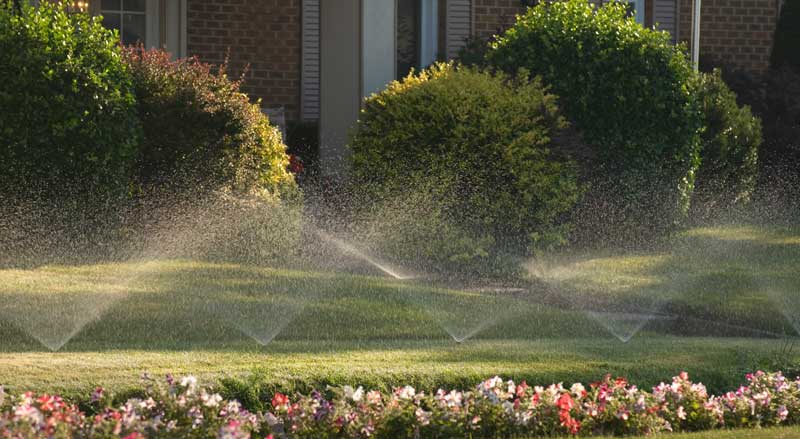
In the summer, the early morning is the best time to water your yard. Afternoon watering in the blistering sun will make water evaporate before it can help your plants. Morning watering gives plants ample time to absorb the water.
The second best time for watering is in the evening—especially if extreme heat is forecasted for the following day.
Don’t be afraid to water deeply—this is exactly what your landscape needs. It allows water to reach the roots. But even on extra hot days, first check the soil for dryness or dampness.
Use a watering can to reach extra-thirsty areas in your garden.
Be sure to first check your municipality’s watering guidelines. Town water restrictions may change during a heat wave. Remember, being informed is better than being fined!
Take Care of Young Plants
Pay particular attention to young plants which are most likely to suffer from heat stress.
If you have young plants that are overly sensitive to heat, cover them the night before or in the early morning. Use a landscape fabric, sheet, or mesh that will partially block the sun.
You can purchase landscape fabric or shade cloth at a local gardening or home center.
Use them properly. Shade cloths, when safely used, allow air to flow underneath, and keep temperatures cooler; plants will be able to breathe. An improperly used shade cloth traps heat underneath and can hurt the plant.
Check the Mulch
Add an extra layer of mulch in extreme heat. This will keep plant roots cooler and moister.
Keep Grass Cut Higher
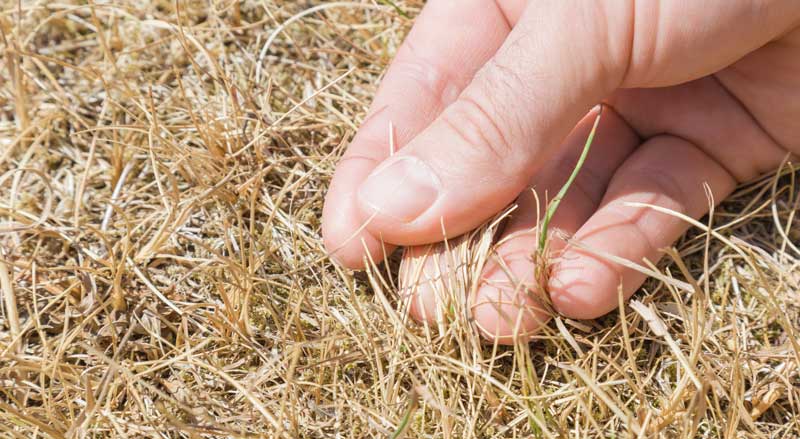
Cutting grass too short during a heat wave causes the lawn to dry out and brown.
Longer grass protects the soil and underground roots from heat and helps retain water.
During a heatwave, don’t cut your grass shorter than three to six inches. Let the clippings stay on the lawn for added protection.
Put Off These Garden Activities
There are certain landscaping events that shouldn’t take place during extreme heat. They are:
- Fertilizing
- Pruning
- Transplanting
These garden activities, although important, do stress plants. Wait until the heat wave is over so your plants can bounce back easily from these stressful events.
Sponzilli Landscaping Group will keep your landscape healthy all year long. Contact us today for more information.

